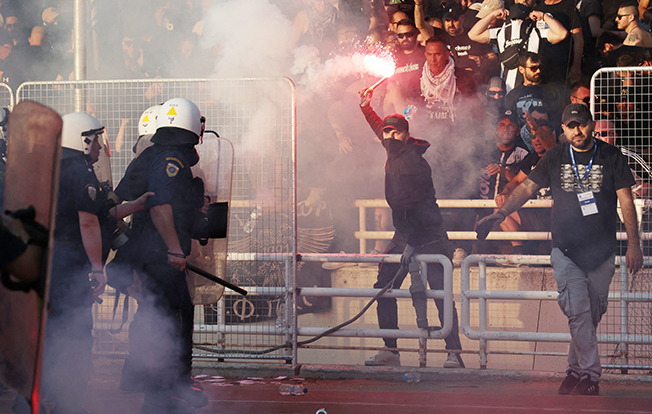“Enough with this [fan rioting] issue. It has been discussed over and over, and every time following incidents there are meetings upon meetings,” President Nikos Christodoulides said after Sunday’s violence by basketball fans outside the Tassos Papadopoulos stadium. Marauding fans also set fire to the offices of the Cyprus Public Transport, causing thousands of euro damage and injuring several policemen. “It is time to act,” he said.
The president said that today’s council of minister’s meeting will take decisions on dealing with hooliganism, warning that sports events could be held behind closed doors if the violence continued. It is true that the violent behaviour of sports fans had been discussed over and over, again. It is also true that outbreaks of violence were followed by series of meetings. These are primarily held so that the authorities could be seen to be doing something, when in fact no effective measures to stop the violence are ever decided.
One of the very few practical measures taken to limit the violence over the years has been the fan card but even this measure has not been properly implemented. For years it was undermined by the clubs and organised fans and the authorities appeared to have given up on it as a way of controlling hooliganism. Inspections of fans entering sports grounds are too random to be effective and fans still take flare guns and flares into stadiums.
This leads to the conclusion that the only way to stop hooliganism is through more forceful policing. Currently police avoid dealing with hooligans on the rampage because when they have done so in the past they face a barrage of criticism for using excessive force. When in the past police, justifiably, tried to clamp down on violent behaviour inside or outside sports grounds, politicians, journalists and the sports clubs accuse them of use of excessive force. As if the thugs who destroy property and throw objects at officers could be brought under control without the use of force, but with polite requests.
Police organisations made this point on Monday, explaining that officers no longer risked manhandling hooligans because they could be charged for using excessive force by oversight committees. They might even be reported by a hooligan. The organisation also said officers felt they did not have the support of the government and they were right. Whenever in the past police had used force to deal with a mob of thugs everyone in society turns against them, siding with the thugs.
Unless this attitude of society changes the police would not, in effect, have the power to deal with hooligans. The council of ministers should consider this when they discuss measures at today’s meeting. It should give police the power to act forcefully to impose law and order and be prepared to back them when they do so. Perhaps they should also make the clubs take some responsibility for their fans. If high-risk matches require a heavy police presence to go ahead the bill for the extra officers should be picked up by the clubs involved. If they are not willing to pay, the match should be held behind closed doors, as the president warned.







Click here to change your cookie preferences